IMF Executive Board to discuss Pakistan loan review, climate financing facility on May 9
The Board will also consider the country's request for modification of performance criteria under the loan program

Haris Zamir
Business Editor
Experience of almost 33 years where started the journey of financial journalism from Business Recorder in 1992. From 2006 onwards attached with Television Media worked at Sun Tv, Dawn Tv, Geo Tv and Dunya Tv. During the period also worked as a stringer for Bloomberg for seven years and Dow Jones for five years. Also wrote articles for several highly acclaimed periodicals like the Newsline, Pakistan Gulf Economist and Money Matters (The News publications)

The International Monetary Fund's (IMF) Executive Board is set to meet on May 9 to discuss two loan programs for Pakistan — the first review of the $7 billion Extended Fund Facility and the $1.3 billion Resilience and Sustainability Facility.
The Board will also consider the country's request for modification of performance criteria under the loan program.
IMF staff and Pakistani authorities reached a staff-level agreement on the first review and a new arrangement under the RSF in March.
The strong implementation of the EFF-supported program continues, and the authorities remain committed to advancing a gradual fiscal consolidation to sustainably reduce public debt, maintaining a sufficiently tight monetary policy to keep inflation low, the Fund said in a statement following the agreement.
The IMF also pointed out other key issues to address, including accelerating cost-reducing energy sector reforms to enhance its viability and implementing Pakistan’s reform agenda to accelerate growth while strengthening social protection and health and education spending.
In its March statement, the international lender said that over the past 18 months, Pakistan has made significant progress in restoring macroeconomic stability and rebuilding confidence despite a challenging global environment. While economic growth remains moderate, inflation has declined to its lowest level since 2015, financial conditions have improved, sovereign spreads have narrowed significantly, and external balances are stronger.
While economic activity is expected to steadily improve, downside risks also remain elevated, the statement said.
Upon approval of the review, Pakistan is likely to get $1.1 billion which would help shore up its foreign exchange reserves, enabling the central bank to reach its target of $14 billion in reserves by June.
Currently, the central bank's foreign exchange reserves are at $10.205 billion. Since November end, reserves are down by almost $1.8 billion mainly because of external debt payments, analysts said.







Comments
See what people are discussing